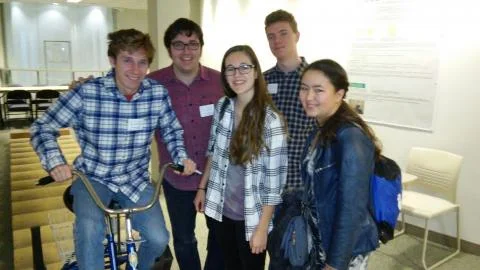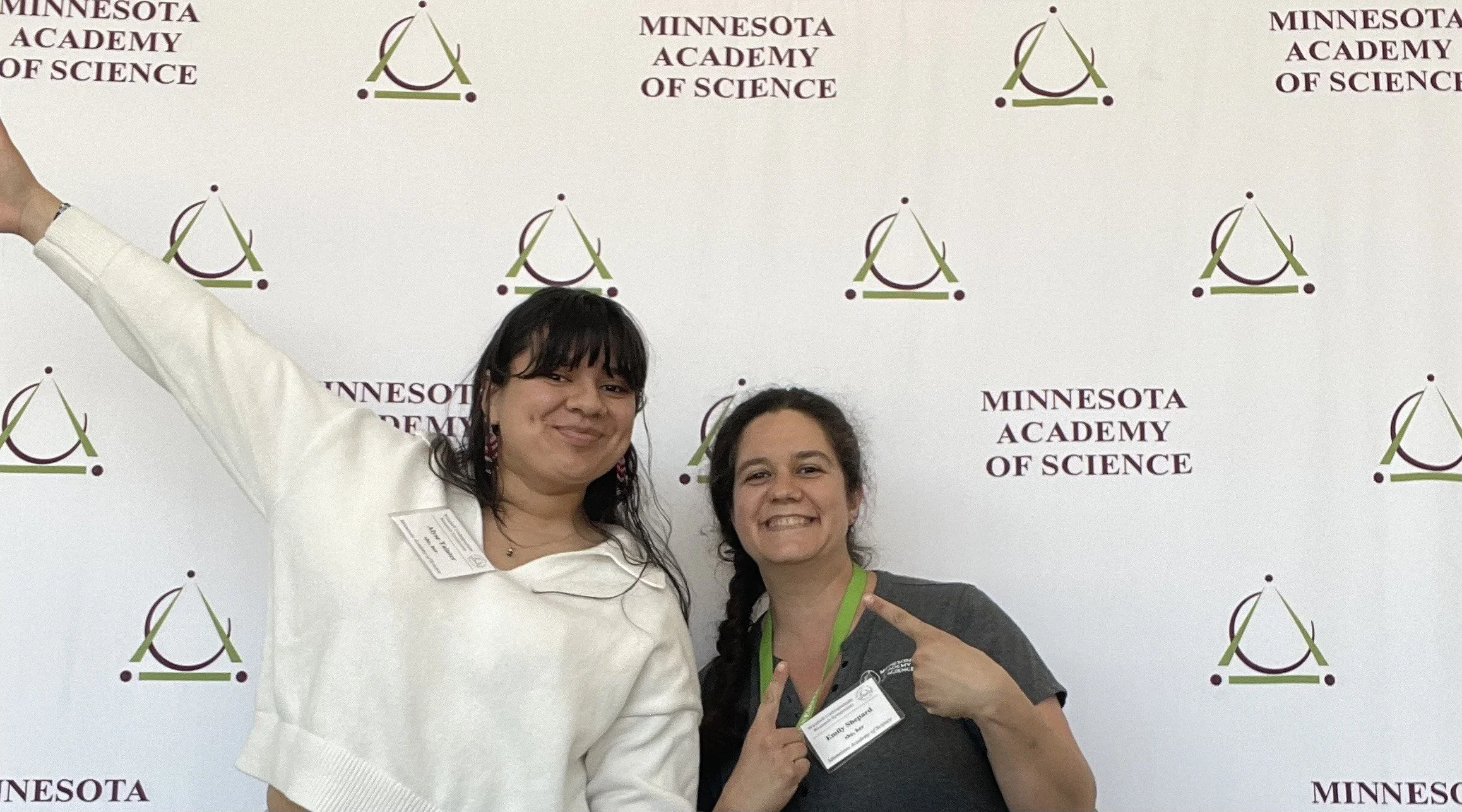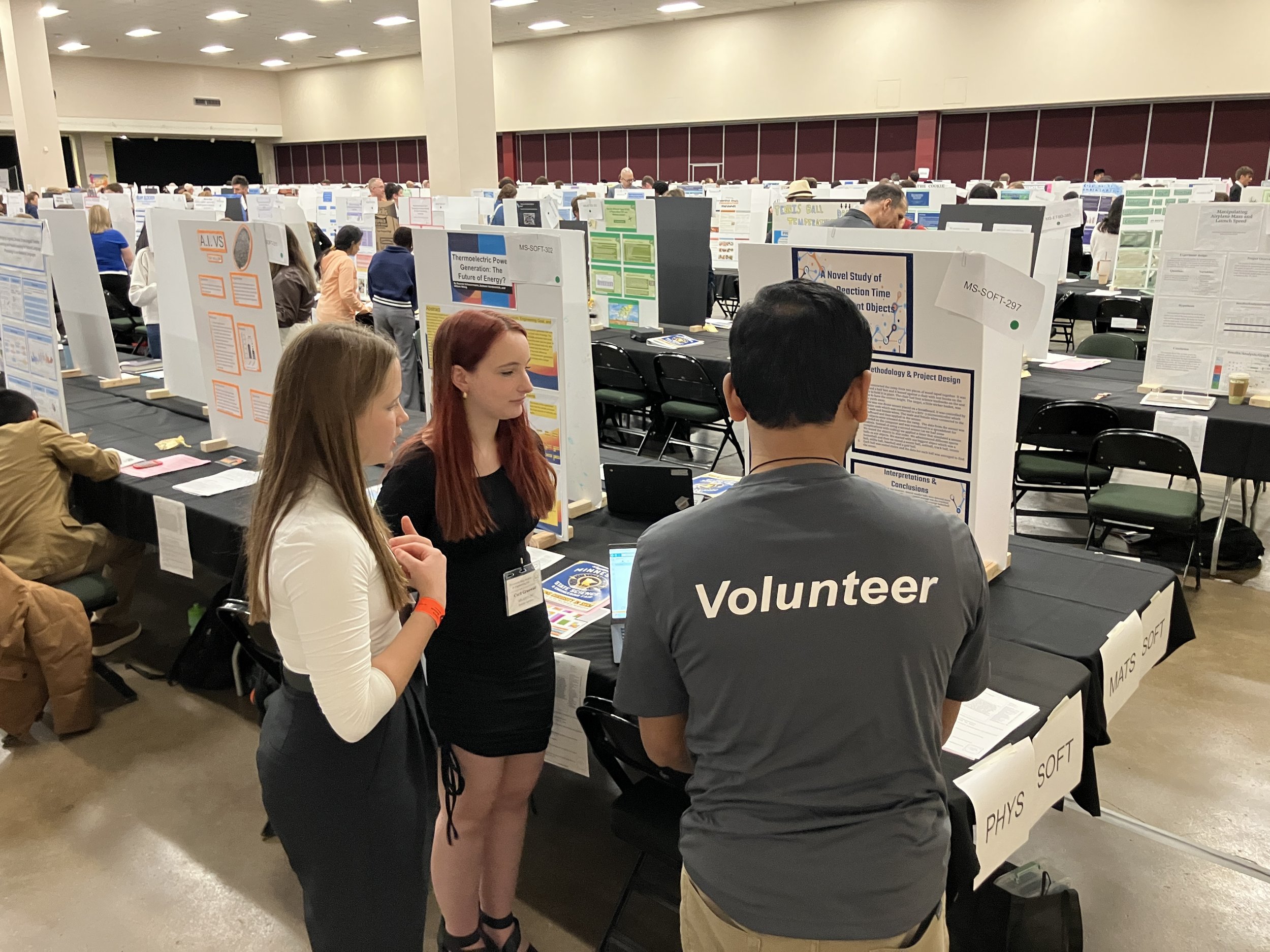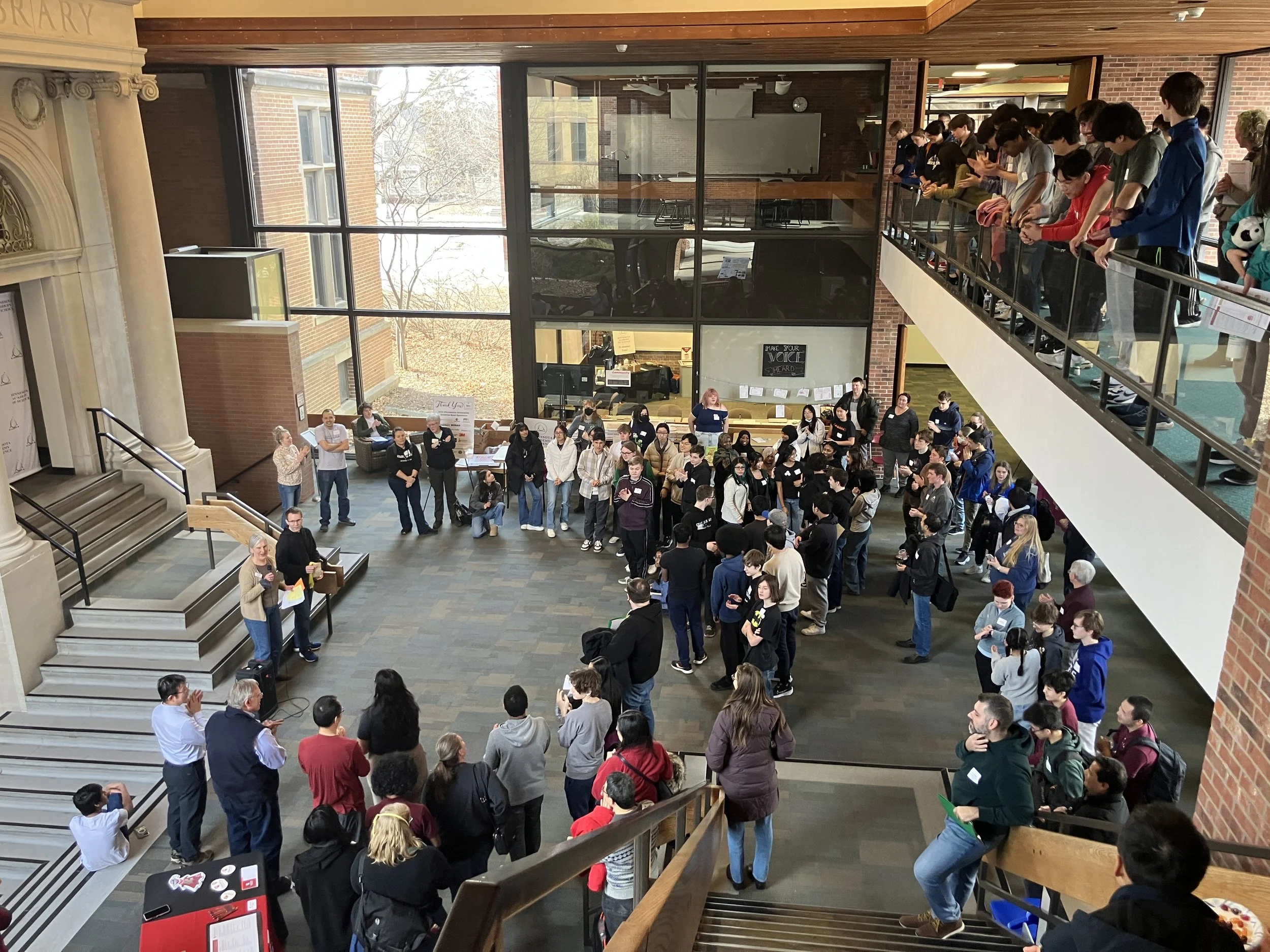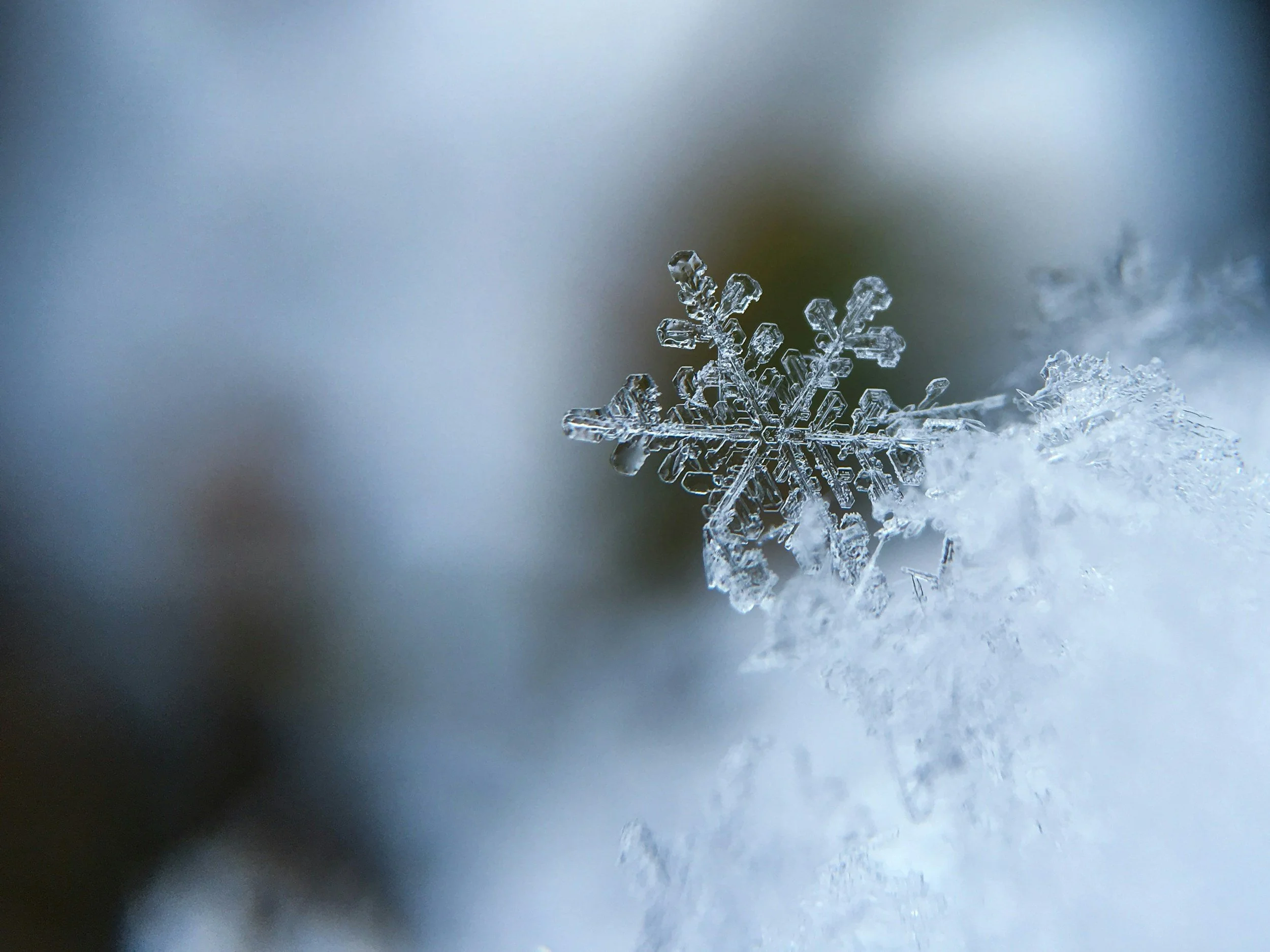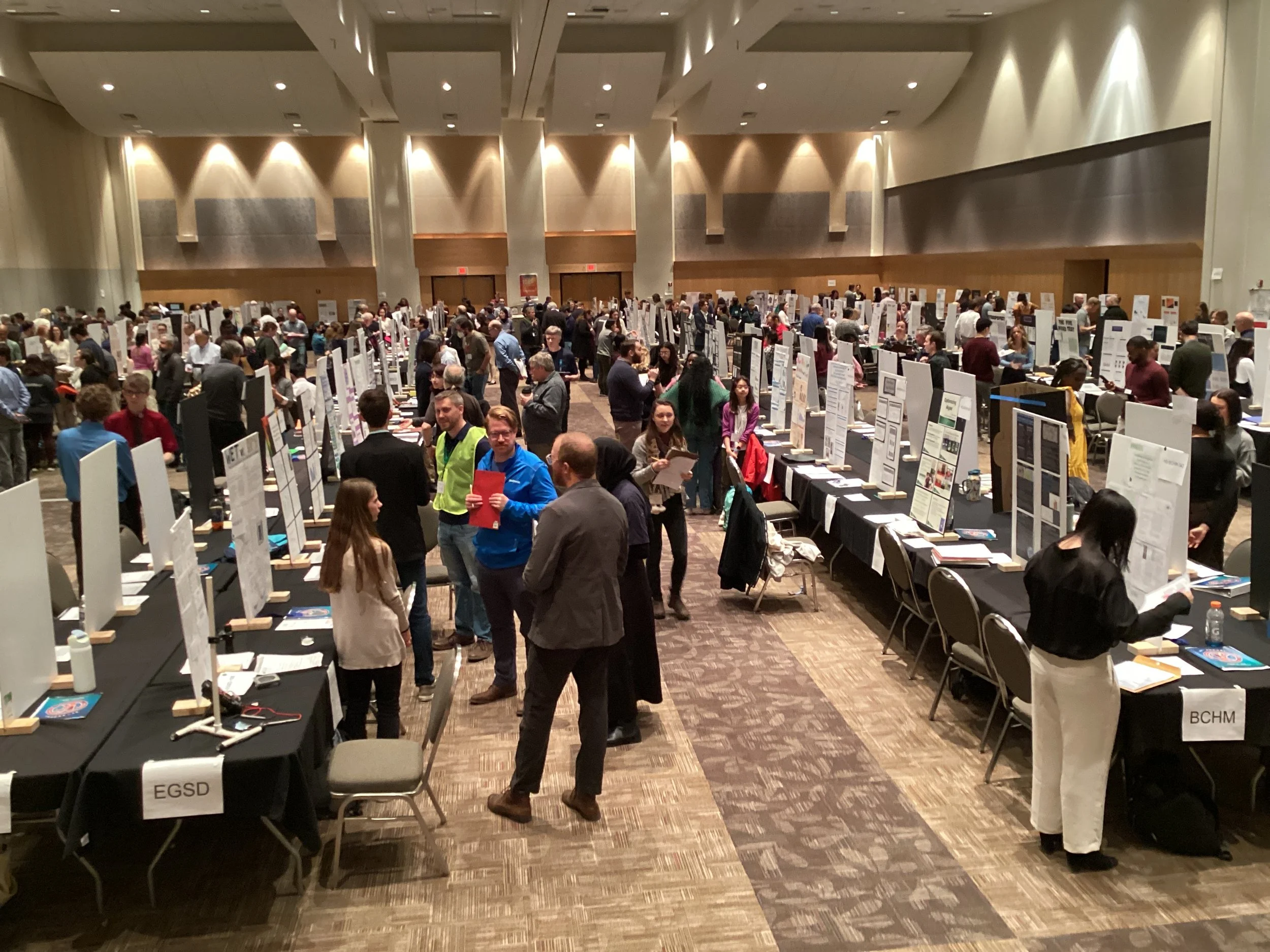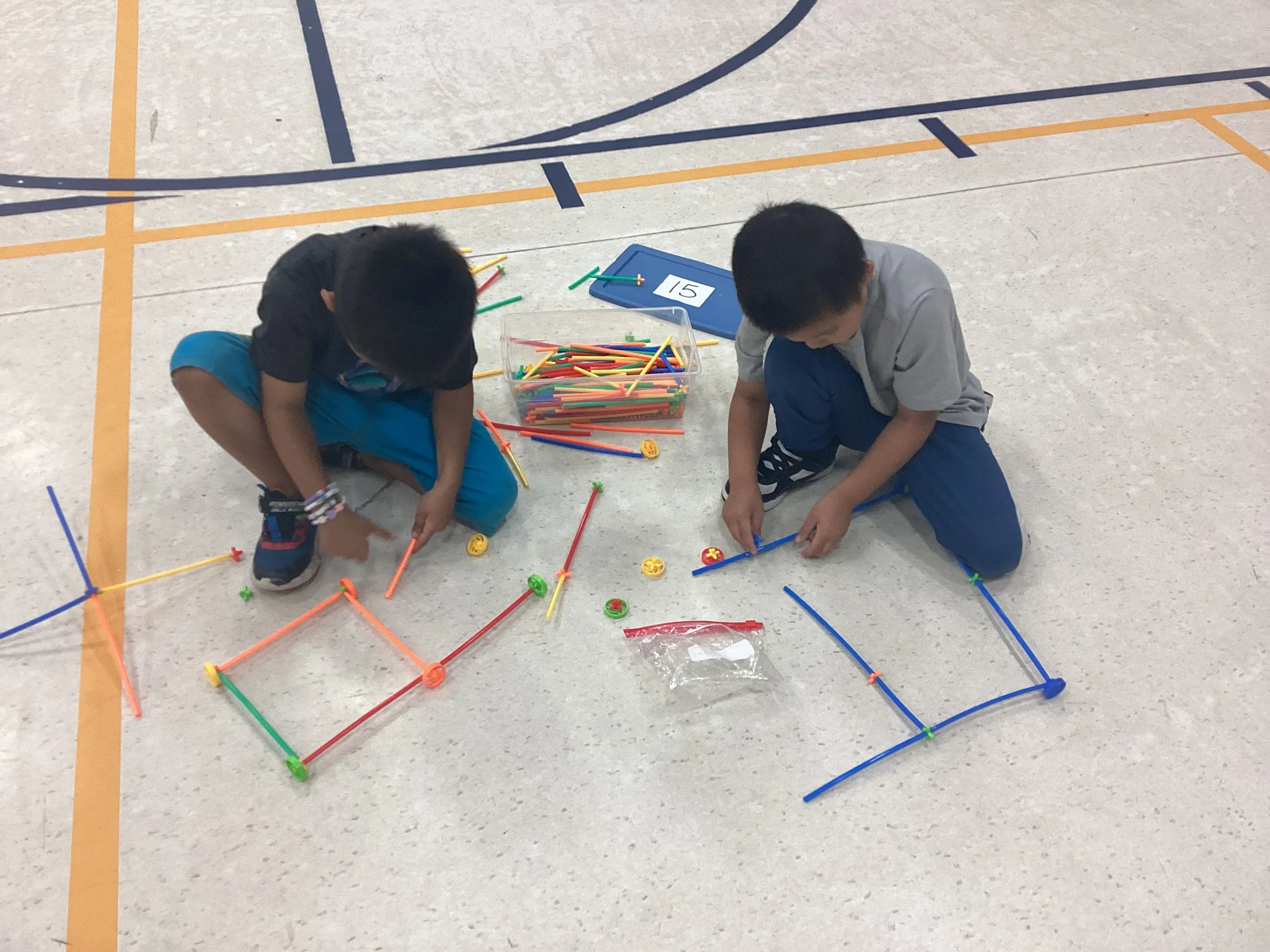January 23, 2016 – St. John’s Prep is a small high school of 200 that made a strong appearance at the 2016 Minnesota High School Science Bowl. It sent two teams from St. Cloud to the Macalester College campus in St. Paul. The school had not sent a team to the Bowl for three years, and it was a first experience for this group of students. They survived 12 rounds of questions, finishing 8-4, and lost only to the top four teams in the 32-team pool.
Minnesota Academy of Science asked the team for its story of the strengths, work and fun they shared on the journey to the Bowl this year.
Q: How did the team come together, and prepare?
Coach Miller: St. John’s Prep is very student-centered. I explained to the entire school what Science Bowl is and announced that if some students would like to take leadership, the science department would support them. Marisa, Nick and Sam took the reins, planning when to have practices to best match busy schedules and dividing up content to study outside of school. Mr. Eric Yanke, the chemistry teacher, and I attended all the practices and read / explained rules. We met at least once a week, usually before school, starting at the end of September. As we got closer to the contest date, Eric and I enlisted the aid of the biology and math teachers to compete against Team One in practice. This helped build the confidence of Team One, plus we had an expert in every field to explain the more difficult questions.
Marisa (pictured center): During practices, we kept the preparation useful by mixing up teams -- to practice having teammates with various strengths, and to find groupings of students that worked well together. After our "Team 1" was determined, we faced off against a team of teachers. It was a lot of fun to challenge the teachers. These practices greatly improved our strategy and buzzing, since it would have been very difficult to beat the teachers based on scientific knowledge alone.
Nick (on bike): Keep the practices light-hearted. That makes the stuff you learn more likely to stick with you than what is learnt through rote memorization.
Sam (purple shirt): It could be very difficult to stay focused so early in the morning, so making things fun was really important to keep morale high.
Q: Do you have a favorite question or moment from the competition?
Coach Miller: My favorite question was one we got wrong. It was about an object accelerating at a certain speed for a certain period of time. It required some seriously fast estimations, and -- this being in the second half of the day -- my team was getting pretty tired by that point. Sam buzzed in and said, “pretty darn fast.” The room chuckled. The reason it was my favorite is because the elimination round is very tense and stressful. Whoever loses that matchup goes home. But Sam’s silly answer reminded everyone that it is, at heart, a game and it lightened the mood. It’s nice to be reminded occasionally not to take yourself too seriously. [And in fact a volunteer who was in that round reported it as a highlight of the day; story about volunteer experiences to come.]
Marisa: On the one-hour drive to the Science Bowl, I looked up some examples of rocks because we had previously been lacking knowledge in geology. During the meet, we were asked something I had read about that morning. I was so excited that I actually knew the answer, quickly buzzed in – and then misspoke the answer by using the wrong word. Luckily, we won the round anyway -- and now I'll never forget that answer.
Nick: Using mathematical intuition to get the answer on some random physics question.
Sam: Before the beginning of the first round, our moderator asked us to say how many times we'd seen Star Wars: The Force Awakens as we introduced ourselves. Being the first round, I thought that was really helpful to loosen everyone up and alleviate some stress. [A few of the kids hadn’t seen it; most had seen it once; Marisa led the pack with two viewings.]
Q: Why would you recommend the Science Bowl experience to other students?
Sam: It’s a great opportunity to expose yourself to many facets of scientific knowledge that would normally go unnoticed. And, it's a good way to make new friends and have fun competing together.
Nick: If you enjoy learning about and thinking critically about science and scientific concepts, Science Bowl provides an amazing competitive environment to challenge yourself.
Marisa: Science Bowl offers a unique opportunity for collaboration. Practices and competitions create environments where discussing science as a team is necessary. I think that this sort of collaborative scientific thinking is great preparation for both high school science courses and a career in science. Also, each correctly answered question is recognition of progress, and each missed question is an incentive to learn more science! And, Science Bowl meets are a lot of fun!
Q: For middle schoolers who will compete next month [Middle School Science Bowl, St. Thomas, February 13], what advice do you have?
Marisa: 1) Before the meet, teams or individuals should pick scientific topics they find interesting and research them. In my experience, I have remembered information I've looked up because I'm curious about it much longer than information I've looked up merely to memorize. 2) Playing as a team diminishes the stress of competition. My team was very supportive of each other. As a result, we as individuals were able to move past mistakes we made without the criticism of others. I think this gave us all more confidence in our buzzing and in our answers. 3) I believe it's essential to value the importance of the preparation and the fun of the competition. The students on the winning team shouldn't be the only ones who have had a valuable experience. Recognizing the amount of science that has been learned is a good way to appreciate Science Bowl, whether you win or lose.
Nick: The worst thing to do is stress over it. Try to have fun and enjoy the process of learning about science.
Sam: Just go in with the expectation that you're there to have a good time and learn science, not to win. While winning is fun, ultimately it is just a game, and you're going to have a much more memorable experience by focusing on the positive aspects of the event instead of worrying about the negative aspects.
Q: How does Science Bowl prep/competition compare to Knowledge Bowl (which St. John’s Prep has won several years)?
Coach Miller: Science Bowl and Knowledge Bowl both require teamwork, confidence and knowledge. Both require quick reflexes and an ability to quickly determine the nature of the question. Anticipating where the question is going before your opponent is key. However, in Knowledge Bowl students work as a single team on all questions. In Science Bowl, students must win the toss-ups without their teammates. Additionally, there is a very big cost associated with early buzzing in Science Bowl that doesn’t exist in Knowledge Bowl. That’s probably the most difficult aspect to get used to.
Marisa: It was a bit of an adjustment to learn new buzzing strategy and to support each other through buzzing mistakes for Science Bowl. But, we are used to supporting each other in both competitive and noncompetitive environments. Three of my Science Bowl teammates are on the Knowledge Bowl team and we’ve won the state tournament together. They are some of my best friends. I think our chemistry outside of Science Bowl helped strengthen our team, and that experiencing Science Bowl challenged and reinforced that chemistry.
Q: Coach Miller, as someone with a breadth of knowledge, did you understand the answers to many of the questions asked during competition?
Coach Miller: I think half is probably right. As a teacher preparing a team for Science Bowl, I actually increased my knowledge of every aspect of science quite a bit. For example, in my research about neutron stars, because of a question a student asked, I learned about nuclear drip lines. I really enjoyed the dialogue this opened up as the team and the two coaches learned many things together. I don’t think I would have had so many challenging academic growth opportunities if we hadn’t done Science Bowl.
About the Contributors
Sam Rogers – During his freshman year he practiced with the team and attended the competition as a spectator. This year, “I competed in Science Bowl for two reasons: first, I know a lot of scientific facts that would be completely useless almost anywhere else, and second, I knew it would be a fun experience with my friends.” He has applied to 13 schools, and hopes to potentially get a Ph.D. in mathematics.
Nick Haeg – a first-year Science Bowl competitor, he intends to double major in biochemistry and economics. “I hope to use my knowledge to help people. Cheesy I know, but true.”
Marisa Gaetz -- This was her first year competing in Science Bowl. “I competed because I have had great experience with Knowledge Bowl, and tend to know a large portion of the science questions asked in that competition. Science Bowl was a way to be asked questions more specific to my academic interests.” She has been accepted into MIT starting in fall 2016, where she plans to study mathematics and physics.
Head coach Charles Miller is a physics and astronomy teacher at St. John’s. Son of a geneticist, he attended the Bronx High School of Sciences while growing up in New York City, before his family relocated to Oklahoma, where he finished high school. He graduated in biology and philosophy at Tulsa University, earned a teaching certificate at Iowa State, followed his wife to Minnesota for her psychology job at St. John’s University, and earned a master’s degree in Educational Technology at Bemidji State. He teaches physics and astronomy, and is certified to teach Earth & Space. He also coaches the school’s Knowledge Bowl team, which covers everything from science to current events to geography to literature.
- written by Mikki Morrissette
